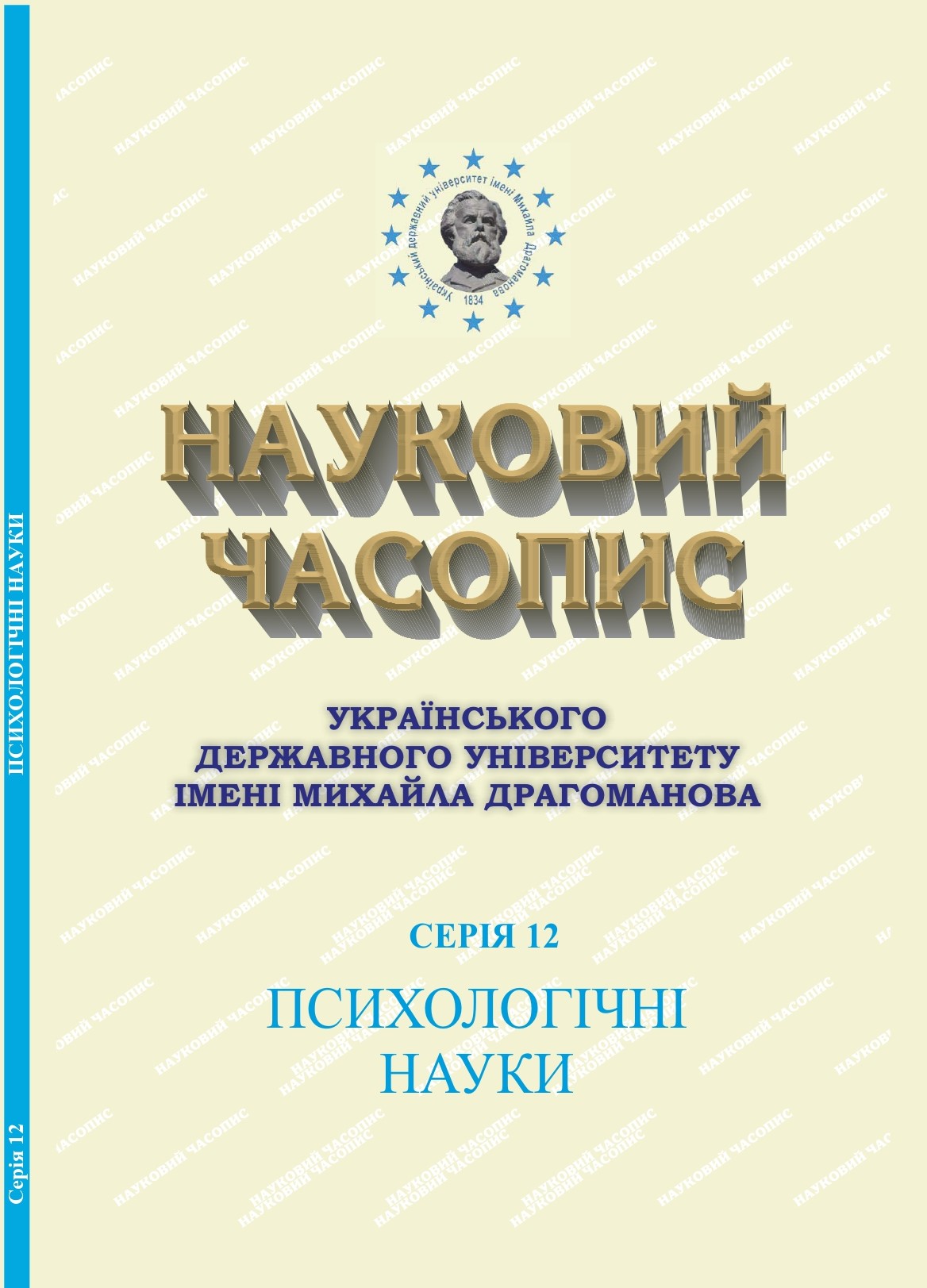RISK PROPENSITY AS A PERSONAL CHARACTERISTIC OF MILITARY PERSONNEL (RELIGIOUS ASPECT)
DOI:
https://doi.org/10.31392/UDU-nc.series12.2024.23(68).09Keywords:
risk, risk propensity, suicide, religious aspect, military personnel.Abstract
Objective. To carry out a theoretical and methodological analysis of the problem of the relationship between risk propensity and religious beliefs of military personnel, empirically verify the presence of individual differences in indicators of the degree of an individual risk propensity tendency depending on their religious views and characterize the peculiarities of the manifestation of risk propensity tendencies of military personnel on the basis of religion. Research methods: theoretical (theoretical, methodological and comparative analysis); empirical (personal risk propensity scale to “RSK”, “Motivation to succeed” and “Motivation to avoid failure” by T. Ehlers, suicide risk questionnaire); methods of mathematical statistics (Student’s t-test, Mann Whitney U-test. and Pearson’s test). Results. It was found that among the military personnel of “atheists”, “Christians” and “pagans”, “atheists” are the most prone to risky behavior, “pagans” are the least prone. A similar trend is observed with regard to the motivation to avoid failure. In addition, the following issue was discovered: military personnel with atheist beliefs are the most motivated to achieve the set goals and at the same time, compared to their religious colleagues, have the most pronounced measure of suicidal behavioral manifestations. a similar comparison of indicators among religious servicemen proved the presence of a lower level of success motivation among “Christians” than among “pagans”, but the situation is the opposite with regard to motivation to avoid failure or a tendency to risky behavior; however, the level of motivational focus on achieving success is higher among military Christians than among military atheists. Conclusions. Risk propensity of military personnel is their individual difference and depends on religious beliefs. Belonging to a religious movement, namely the nature of religious beliefs, contributes to the adoption of more moderate decisions. In this way, religion acts as an additional element of external control, which contributes to a critical review of one’s actions and, accordingly, increases the chances of the military to survive in critical situations on the battlefield.
References
- Nakaz «Pro zatverdzhennia Polozhennia pro sluzhbu viiskovoho dukhovenstva (kapelansku sluzhbu) u Zbroinykh Sylakh Ukrainy» [On the approval of the Regulation on the service of military clergy (chaplain service) in the Armed Forces of Ukraine] vid 27.01.2015 № 40. Retrieved from: https://zakon.rada.gov.ua/laws/show/z0161-15#Text [in Ukrainian].
- Vasyliev, S. (2021). Psykholohichni umovy rozvytku psykholohichnoi stiikosti (rezyliiensu) u viiskovosluzhbovtsiv u protsesi bazovoi zahalnoviiskovoi pidhotovky [Psychological conditions for the development of psychological stability (resilience) in servicemen in the process of basic military training]. Visnyk Natsionalnoho universytetu oborony Ukrainy – Bulletin of the National University of Defense of Ukraine, 61(3), 5–13. Retrieved from:https://doi.org/10.33099/2617-6858-2021-61-3-5-13 [in Ukrainian].
- Voroshchuk, O., & Novikova, V. (2021). Rozvytok normatyvno-pravovoi bazy z pytan zadovolennia relihiinykh potreb viiskovosluzhbovtsiv zbroinykh syl Ukrainy u 1991–2017 rokakh [The development of the legal framework for meeting the religious needs of servicemen of the armed forces of Ukraine in 1991–2017]. Voienno-istorychnyi visnyk – Military historical bulletin, 42(4), 89–104 [in Ukrainian]. https://doi.org/10.33099/2707-1383-2021-42-4-89-104
- Kokun, O.M., Ahaiev, N.A., Pishko, I.O., Lozinska, N.S., & Kornia, L.V. (2019). Psykholohichne vyvchennia osobovoho skladu Zbroinykh Syl Ukrainy [Psychological study of the personnel of the Armed Forces of Ukraine]. Kyiv : FOP Maslakov [in Ukrainian].
- Kokun, O.M., Moroz, V.M., Pishko, I.O., & Lozinska, N.S. (2021). Formuvannia psykholohichnoi hotovnosti viiskovosluzhbovtsiv viiskovoi sluzhby za kontraktom do vykonannia zavdan za pryznachenniam pid chas boiovoho zlahodzhennia [Formation of psychological readiness of military servicemen under contract to perform assigned tasks during combat coordination]. Kyiv : 7BT [in Ukrainian].
- Kravchenko, V. (2021). Psykholohichnyi stan viiskovosluzhbovtsiv pid chas adaptatsii do diialnosti v ekstremalnykh umovakh yak obiekt teoretychnoho doslidzhennia [The psychological state of military personnel during adaptation to activities in extreme conditions as an object of theoretical research]. Visnyk Natsionalnoho universytetu oborony Ukrainy – Bulletin of the National University of Defense of Ukraine, 60(2), 71–80 [in Ukrainian]. https://doi.org/10.33099/2617-6858-2021-60-2-71-80
- Shaian, V. (2019). Vira predkiv nashykh. Vybrani tvory. [Faith of our ancestors. Selected works]. Kyiv : FOP Stebeliak [in Ukrainian].
- Dykha, V., & Lukianova, V. (2023). Ryzyky enerhorynku: sutnist definitsii ta kharakterystyky [Energy market risks: the essence of the definition and characteristics]. Modeling the development of the economic systems, (1), 28–36 [in Ukrainian]. https://doi.org/10.31891/mdes/2023-7-4
- Psykholohichnyi tlumachnyi slovnyk naisuchasnishykh terminiv (2009). B.Shapar (Ed.). Kharkiv : Prapor [in Ukrainian].

